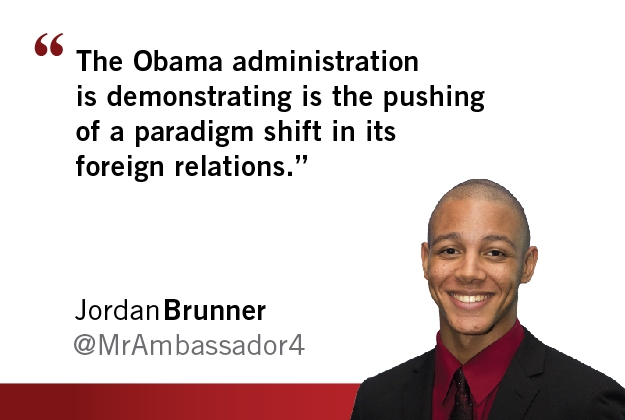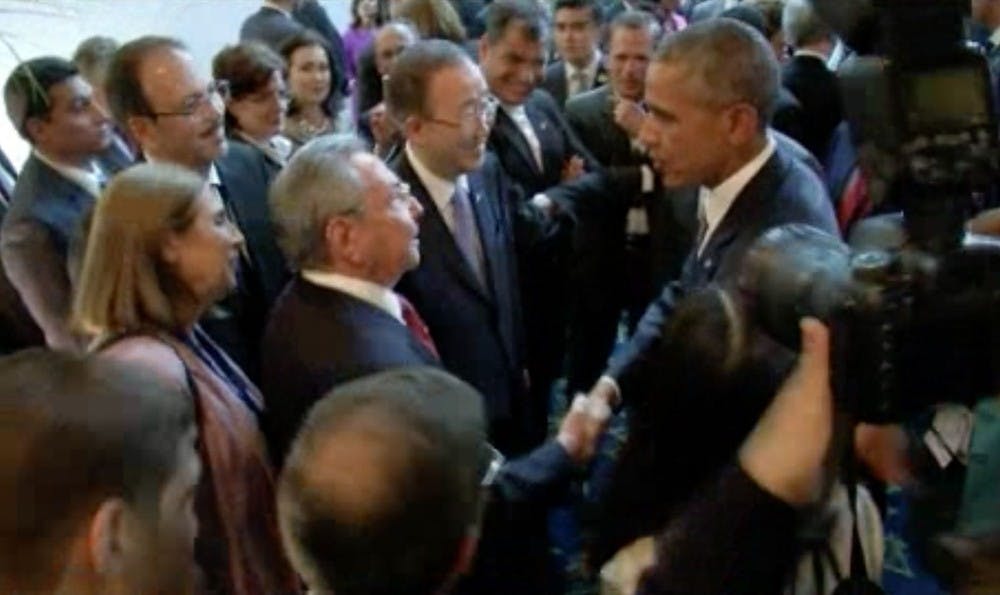The slight chill in Panama stemming from the light rain that fell from the sky could not be more symbolic of the historic moment when President Barack Obama and Cuban President Raúl Castro shook hands during an aside at the Summit of the Americas on Saturday. After over 50 years of an extremely cold and frosty relationship between the two countries — ever since former President Fidel Castro took over Cuba in a revolutionary coup — the sun is finally starting to come out from behind the clouds and turn the frost into a steadily warmer atmosphere as angry rhetoric and actions subside.
Although this moment is historic, it is not surprising, given the attitude of our President towards other nations. New York Times columnist Thomas Friedman, in his sit-down with Obama just last week, chronicled the “Obama Doctrine,” the tag line for which is this: “We will engage, but we preserve all our capabilities.” This came on the heels of another historic event, which was the conclusion of a framework for a nuclear deal with Iran.
Whatever the merits of the Iran nuclear deal in its final stages, what the Obama administration is demonstrating is the pushing of a paradigm shift in its foreign relations. Even as it maintains the position of the U.S. in the world of geopolitics, the Obama administration wishes to reform and even revolutionize the way that the U.S. does business with other countries. Obama made small steps towards this shift back in his first term, beginning with his historic speech in Cairo on Muslim-American relations (aptly entitled “A New Beginning”).

What is surprising given the foreign policy shift of late is that Obama, though the man shaking Castro’s hand and propagating a paradigm shift in foreign policy that has allowed this moment to take place, was not the person actually responsible for the normalization of relations between the U.S. and Cuba. That honor goes to Pope Francis I. Through the good offices of the Vatican, which originally had the very limited mission of trying to free Alan Gross from Cuba, a diplomatic understanding was reached between our two nations last year.
This historic moment in the relationship between Cuba and the U.S., even as it builds upon existing measures that have been taken in recent months and the actions of the Pope, is heavy with symbolism and demonstrates the pragmatic and smart foreign policy goals of the Obama administration. This is the kind of foreign policy leadership that I expect from the democratically elected officials of our government.
Yet even as the Obama administration makes progressive gains in its strategic and diplomatic relationships with other countries, there is still a lot of work to be done. Ordinary Cubans, who have suffered the most over the years of economically-cutting, politically-isolating and nearly lethal actions taken by the U.S. against the Castro regime, and who would be the most likely to benefit from a complete thaw, have yet to see concrete results. There are a lot of “could-happens” in the business and trade sectors, and not enough results, according to many Cubans.
As the paradigm shift continues to have ripple effects on the state of world affairs, there must be more concrete action, both on the part of the private sector and on the part of Congress. The President has set the diplomatic and strategic stage, and Congress needs to be as smart and pragmatic as our president is being on this issue. Congress needs to take the weather (both politically and literally) as a sign of future goals and future prosperity.
Reach the columnist at jbrunne2@asu.edu or follow him on Twitter @JARBrunner4.
Editor’s note: The opinions presented in this column are the author’s and do not imply any endorsement from The State Press or its editors.
Want to join the conversation? Send an email to opiniondesk.statepress@gmail.com. Keep letters under 300 words and be sure to include your university affiliation. Anonymity will not be granted.
Like The State Press on Facebook and follow @statepress on Twitter.




